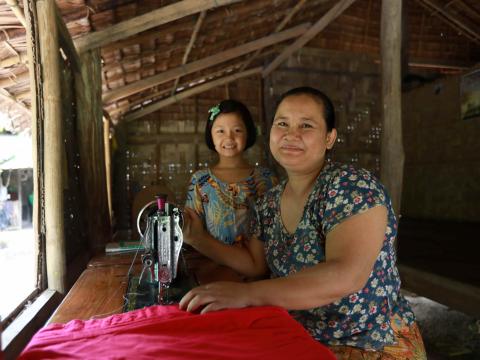Daw Mu: A single mother’s amazing journey

In a small village near Pathein city in Myanmar, lives a strong woman named Daw Mu. She is 40 years old and has two children, a 16-year-old son, and a 9-year-old daughter. She is a widow and a single mother, meaning that she has to take care of her children all by herself.
She said, “I have devoted my life to providing a better life for my children.”
Daw Mu's husband had gone to work as a migrant worker in Thailand to secure a brighter future for their family when their youngest daughter was only 9 months old. However, things didn't go well, and he couldn't send enough money back home. In 2021, Daw Mu lost contact with him.
"I don't know if he's alive or lost," she sighed, her voice echoing the shadows of her heart.
Life was really tough for Daw Mu. The burdens of single motherhood weighed heavily on her. A lack of business knowledge and limited access to health education became added layers of challenges she had to navigate. During the early years, support from her parents played a vital role in helping her make ends meet.
Then, a glimmer of hope emerged when she joined hands with World Vision Myanmar.
World Vision Myanmar selected Daw Mu's family to participate in the Under Poor Graduate (UPG) Programme between 2019 and 2021. This initiative provided her family with pigs and chickens, so they could start a small livestock farm. Alongside this, Daw Mu herself underwent training in modern livestock management techniques. The newfound knowledge has empowered her to provide proper nourishment, vaccinations, and a safe environment for her animals.
Before, Daw Mu didn't know much about farming animals. She didn't realize that improper livestock farming could make the animals and her family sick.
Selling the pigs used to take a long time, but with the new ways Daw Mu learned, it became faster. She could sell them in just four months instead of waiting for a whole year. In the rainy season, they ate eggs, and in the summertime, they sold chickens.
She happily said, “Now, through systematic gardening techniques, my income begins to soar.”
In addition, Daw Mu learned how to make her garden grow better. She participated in the World Vision training on home gardening and making bio-fertilizers out of plant and animal waste. This enabled her to cultivate organic vegetables, which not only saved her money on daily meals but also earn extra by selling them. She is providing extra vegetables from her garden to the neighbouring families who are going through the same hardship as she did.
Daw Mu had also access to vocational training from sewing basic shirts to clothing design thanks to World Vision Myanmar. Her confidence and income both benefit from it.
Her transformation extended beyond her own home. World Vision’s social life skill training, encompassing health, education, child protection, savings, and nutrition, turned her into a beacon of knowledge within her community. She started helping out at a Christian school and sharing what she knew with others. Moreover, she became an integral part of a community-based organization, initiated by World Vision Myanmar.
Now, Daw Mu found herself not only rebuilding her physical home but also rebuilding her life. The once-introverted woman found herself engaging with others, reaching out to those facing struggles similar to hers, offering them sustenance from her abundant garden.
She passionately shared her next dream, “I will continue to nurture my children to become educated individuals.”
Since May 2003, the Pathein Area Program (AP) has been running technical projects through strong coordination with respective stakeholders, focusing in particular on child protection, resilience and livelihood, health, and education. Throughout the lifetime of the area program, it has facilitated the formation of key structures to carry forward activities post-AP life for instance Health Committees, Early Childhood Care Development committees, Advocacy groups for child protection, and Saving for Transformation (S4T) groups. As of 2022, the Pathein AP has positively impacted more than 2,8000 total beneficiaries, including nearly 9,000 children, to enhance their living standards, attitudes, and behaviours.